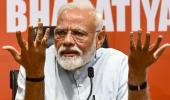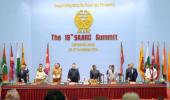'The current institutional arrangement that disperses strategic decisions to the ministry of commerce and industry and the ministry of external affairs lacks the necessary depth.
'It is high time that the government focused on a trade policy to help sustain high long-term growth and create jobs than to spend time on quick fixes to step up short-term growth,' says Jayanta Roy.
Illustration: Dominic Xavier/Rediff.com

The recent dips in GDP growth are causing concern.
Short-term measures have been announced. But these are far from sufficient since the problem is structural.
No economy has experienced high sustained growth without a trade policy to promote exports.
Both the United Progressive Alliance (UPA) and the National?Democratic Alliance (NDA) have had the luxury of neglecting trade policy since falling oil prices put no strain on the balance of payments (BoP).
Exports have been totally neglected. The UPA had a brief period of export growth mainly due to buoyancy in global trade.
India too since the last decade took a reactive trade negotiations stance.
Being “at the table” as a proactive member is not a choice for an aspiring major global player, but a necessity.
At the WTO, India is pleading for special and differential treatment citing it has a large population below the poverty line, yet boasting that it is going to be a $ 5 trillion economy in five years.
It has shied away from any pluri-lateral agreements. It has a very poor record in regional agreements.
Well before US President President Trump initiated the trade war, India has been consistently raising tariffs in successive Budgets.
We have not yet met the promise we made at the Trade Policy Statement of 1991 that we shall bring down our average tariff to Asean levels in 10 years.
Our exchange rate is overvalued.
We did make substantial progress in the last two years in improving our ranking in the World Bank’s Ease of Doing Business and Trading across Borders indicators.
But we still need more reforms to reduce trade transaction costs.
India now faces very severe global headwinds that can create strain on the BOP.
Anti-globalisation and anti-immigration drives in the United States and parts of Europe may result in reduced market access for the export of goods and services.
Our information technology giants are already affected by the impending H-1B visa reforms.
Barriers related to the emerging issues in data privacy and data restrictions are now the areas of maximum concern for the future growth of off-shore professional and technical services models (such as business process outsourcing or knowledge process outsourcing).
Given the complexity of the current global landscape, trade reforms must be designed and implemented in a timely manner by a competent wing of the government.
India urgently needs better management of its international economic relationship.
The current institutional arrangement that disperses strategic decisions to the ministry of commerce and industry and the ministry of external affairs lacks the necessary depth.
We definitely need to create an independent trade policy council outside the line ministries reporting directly to the PM.
We need an experienced chief trade negotiator, and an internationally-reputed chief economist in that council.
The areas of reform we need to focus on immediately are:
Achieve international competitiveness: Bring average tariff levels to Asean levels by 2021.
The average tariff level in India for non-agriculture is 13.6 per cent, compared to 5.3 per cent in Malaysia, 7.3 per cent in Thailand and 8.4 per cent in Vietnam.
This reduction is a must to not only promote exports, but to make our industry internationally competitive in the turbulent global market to which we are intrinsically integrated.
Further reduce transaction costs: Fully implement the recommendations of the Logistics Development Report of the PM’s Economic Advisory Council (PMEAC).
While we made progress in trade facilitation, we need to focus now on placing the logistics division in commerce and industry ministry to report directly to the prime minister to implement fully the recommendations of the report.
This was my recommendation in the draft I presented to the PMEAC, which was changed to take account of the government business rules.
Since logistics covers several ministries, it cannot be placed under a single line ministry.
Proactive stance in trade negotiations: India has a dismal record in regionalism.
We don’t have a single successful FTA, nor are we an important player in any regional agreement.
SAARC is non-functional.
India is a bystander at the Regional Comprehensive Economic Partnership (RCEP).
India never prepared for the Trans-Pacific Partnership (TPP).
Our trade experts were thrilled when President Trump moved US out of it.
But the remaining 11 original members of TPP led by Japan have resurrected the TPP calling it the Comprehensive and Progressive Agreement for Trans-Pacific Agreement (CPTPP).
But India is nowhere in the picture.
Given that CPTPP will be the largest global value chain in the world, India cannot be left out of it.
Some adjustment in exchange rate: The RBI Real Effective Exchange Rate does show an appreciating trend from 94.6 in October 2018 to 99.6 in April 2019.
Over the longer haul, the appreciation has been much higher.
It is high time that the government focussed on a trade policy to help sustain high long-term growth and create jobs than to spend time on quick fixes to step up short-term growth.
Jayanta Roy is a former economic advisor in the Union commerce ministry.












 © 2025
© 2025